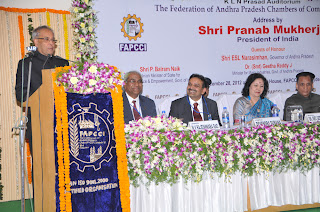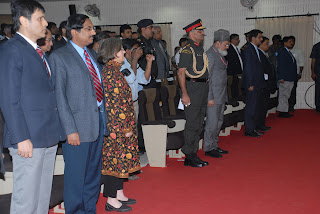FAPCCI in association with
Institute of Small Enterprises have organized the event of release of India
MSME Report 2012 at Surana Udyog Auditorium.
Sri Srinivas Ayyadevara, Senior
Vice President, FAPCCI in his address urged the government to take measures to
improve the share of industrial sector in APGSDP, which is currently at around
11% to 16%, which is the national average.
Dr. P.M. Mathew, Director,
Institute of Small Enterprises and Development has given the highlights of the report.
Dr. Rajat Kumar, IAS,
Commissioner of Industries released the Report and spoke on the occasion.
He congratulated Dr. Mathews for
the exhaustive work done by the institute, which is referred by Government
Planning Departments and also the Industry Associations.
He said that 80% of industry
problems are related to 20% problems and termed it as 80-20 Policy. The major
problem that is faced by the industry in the state now is power and said that
government is ready to supply 400 MW of power to industry at a higher price and
commended FAPCCI or taking up similar exercise. Other problem that needs
immediate attention is Credit availability to the industry and said India is lacking
Credit worthiness rating system as in Korea.
He stated that we need to focus
on two things:
What all policies/programs are
available for industry and how they are implemented and
Revival of sick units and apply
our heart and mind to solve the problem of sickness.
Other Participants in the
programme are Dr. Chandrasekha Reddy, Director General, NIMSME; Dr. Akadas,
Director, MSME-DI; Mr. Kannan, General Manager (SMEs), Andhra Bank, Dr. Rammohan
Rao, Head of the Department, Geetam’s Institute of Management, Mr. Arukumar
Dukkipati, Chairman, Industrial Development Committee, FAPCCI
Mr. Shiv kumar Rungta, Vice President, FAPCCI
has proposed vote of thanks.




























